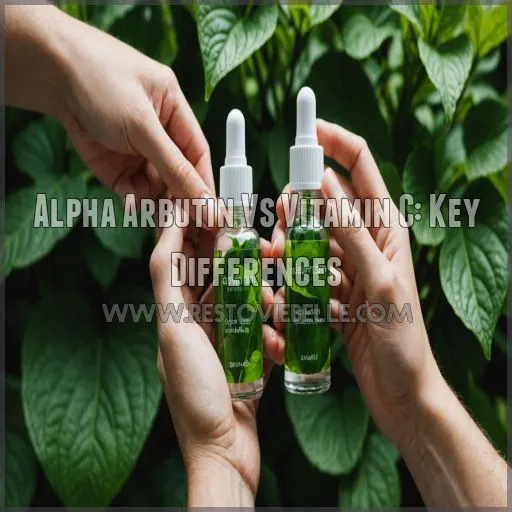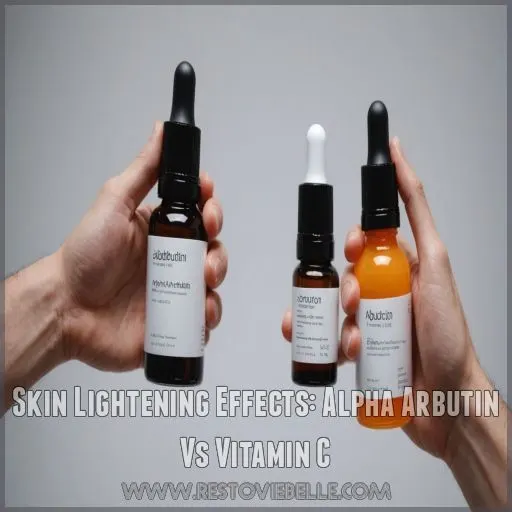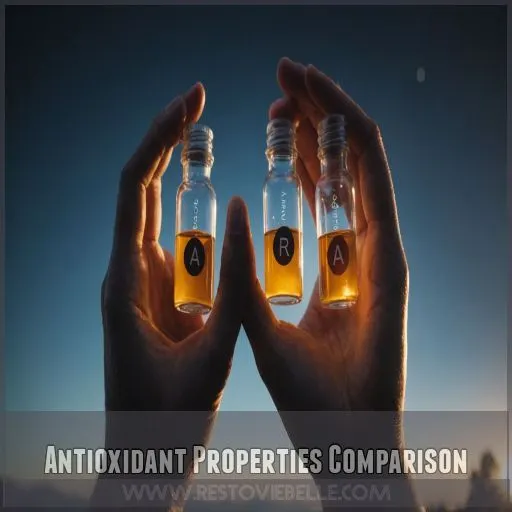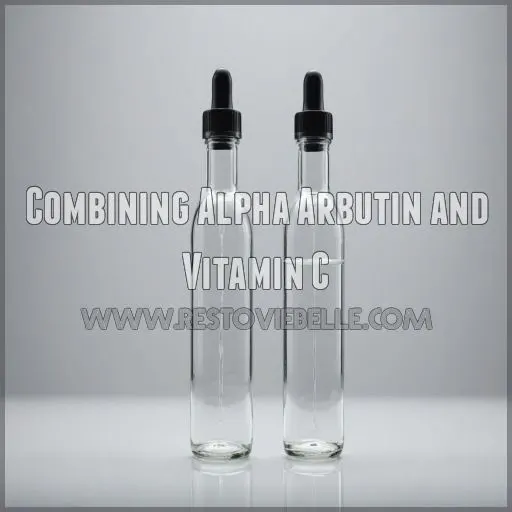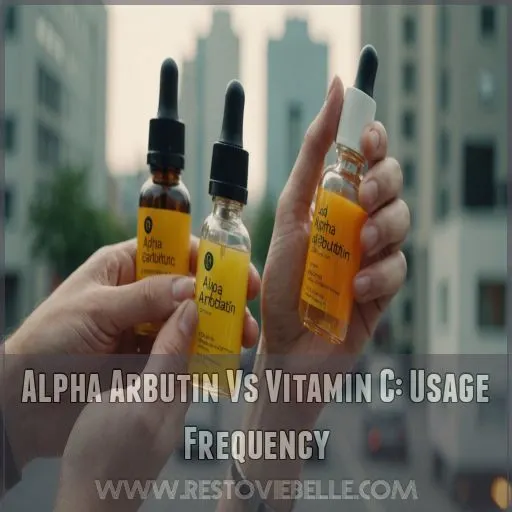This site is supported by our readers. We may earn a commission, at no cost to you, if you purchase through links.

While they both work to even out your complexion, they have some key differences. Alpha arbutin is a synthetic compound that blocks the enzyme that causes dark spots, while vitamin C is a natural antioxidant that boosts collagen production. Alpha arbutin is more stable and has a longer shelf life, but vitamin C packs a stronger punch.
The best part? You can use them together for a one-two punch against dullness and discoloration. Just be mindful of your skin type and start slow to avoid any irritation. Ready to glow?
Table Of Contents
- Key Takeaways
- Alpha Arbutin Vs Vitamin C: Key Differences
- Skin Lightening Effects: Alpha Arbutin Vs Vitamin C
- Antioxidant Properties Comparison
- Nailedit, right?
- Combining Alpha Arbutin and Vitamin C
- Side Effects and Skin Sensitivity Considerations
- Alpha Arbutin Vs Vitamin C: Usage Frequency
- Choosing Between Alpha Arbutin and Vitamin C
- Frequently Asked Questions (FAQs)
- Which is better, alpha arbutin or vitamin C?
- What works better than alpha arbutin?
- What not to mix with alpha arbutin?
- Can I use alpha arbutin every day?
- What are the storage requirements for Vitamin C serums?
- Can Vitamin C and Alpha Arbutin prevent acne?
- How does Alpha Arbutin work with other skincare ingredients?
- Are Alpha Arbutin products safe during pregnancy?
- Which skin tones benefit most from Alpha Arbutin?
- Conclusion
Key Takeaways
- When it comes to brightening your skin, you’ve got two powerhouse ingredients to choose from: alpha arbutin and vitamin C. While they both work to even out your complexion, they have some key differences in terms of skin absorption, stability, and concentration levels.
- Alpha arbutin is a synthetic compound that blocks the enzyme that causes dark spots, while vitamin C is a natural antioxidant that boosts collagen production. The best part is that you can use them together for a one-two punch against dullness and discoloration; just be mindful of your skin type and start slow to avoid any irritation.
- Combining alpha arbutin with vitamin C can give your skin a brightening boost, much like finding the perfect co-star for your favorite movie. Vitamin C works great in the morning, while alpha arbutin shines in the evening, creating a dynamic duo against age spots, melasma, and post-acne scars.
- When choosing between alpha arbutin and vitamin C, consider your specific skin concerns, budget, and product availability. It’s a good idea to consult a dermatologist to find the right brightening solution for your unique skin type and needs. With a little trial and error, you’ll be glowing in no time.
Alpha Arbutin Vs Vitamin C: Key Differences
When you’re trying to choose between alpha arbutin and vitamin C for brighter skin, knowing how they work and where they come from can help.
Alpha arbutin and vitamin C differ in their skin absorption, stability, and concentration levels in products.
This can be really important if you don’t want your bathroom cabinet looking like a chemistry lab!
Chemical Composition and Sources
In this skincare showdown, let’s explore alpha arbutin and vitamin C. Both are plant-derived brightening agents with distinct chemical properties. Alpha arbutin boasts a stable molecular structure, ensuring a longer shelf life. Vitamin C, known for its natural instability, can be a finicky friend. So, which one will keep you glowing?
- Alpha Arbutin: Often synthetic, stable, less sensitive
- Vitamin C: Natural, powerful, but unstable
- Plant Sources: Arbutin from berries, Vitamin C from citrus
- Usage: Choose based on skin needs and lifestyle
Mechanism of Action on Skin
Switching gears from their origins to how they tick: Alpha arbutin and vitamin C work wonders on your skin through cellular signaling. Alpha arbutin blocks tyrosinase—a trickster enzyme causing dark spots—while vitamin C champions collagen synthesis and inflammation reduction.
| Action | Alpha Arbutin | Vitamin C |
|---|---|---|
| Melanin Inhibition | Tyrosinase inhibition | Direct/free radical action |
| Collagen Impact | None | Boosts synthesis |
| Overall Tone Improvement | Evens skin tone | Reduces uneven skin tone |
Skin’s never felt so pampered!
Absorption and Penetration Rates
You’ll be pleased to know that both alpha arbutin and vitamin C are readily absorbed into the skin.
Alpha arbutin is a bit quicker to penetrate, thanks to its smaller molecular size.
Plus, it’s water-soluble, allowing for deeper absorption.
Vitamin C, on the other hand, is oil-based, so it may take a bit more time to fully soak in.
Stability and Shelf Life
It’s not just about how fast sigma alpha arbutin and direct vitamin C absorb—stability and shelf life play a big role too.
Think of vitamin C like a picky houseguest; it needs perfect storage conditions or it’ll spoil faster than milk.
Whereas alpha arbutin, happily chilled, doesn’t nag about ingredient degradation.
| Aspect | Alpha Arbutin | Vitamin C |
|---|---|---|
| Stability | High | Moderate |
| Expiration | Longer | Shorter |
| Packaging | Tolerant | Protective |
Concentration Levels in Skincare Products
Choosing the right skincare products is like walking through a maze.
You’ll notice concentration levels vary—alpha arbutin often at 2%, while vitamin C can range from 10-20%.
High concentrations might boost product effectiveness, but watch for ingredient stability!
Too much vitamin C, and your skin could react.
For a stable solution, follow dosage recommendations and choose wisely.
Skin Lightening Effects: Alpha Arbutin Vs Vitamin C
If you’re trying to lighten your skin, choosing between alpha arbutin and vitamin C can feel like choosing a favorite ice cream flavor—both have their unique perks.
Let’s take a closer look at how each of these skincare powerhouses tackles melanin production, the speed of results, and the types of hyperpigmentation they best address.
Melanin Inhibition Potency
If you’re looking to lighten dark spots and even out your complexion, alpha arbutin packs a powerful punch.
Alpha arbutin is a natural skin-brightening agent that effectively blocks the enzyme tyrosinase, which is responsible for melanin production in Naturium’s Alpha Arbutin Essence.
By disrupting this process, alpha arbutin can visibly lighten dark spots and even out your complexion for a more radiant, luminous glow.
Effectiveness on Different Types of Hyperpigmentation
Alpha arbutin and vitamin C both tackle hyperpigmentation, but they have their own specialties. Facing melasma, alpha arbutin is your gentle giant.
- Post-inflammatory hyperpigmentation? Vitamin C’s got this one in the bag.
Sun spots and age spots can benefit from both.
- Freckles? Alpha arbutin says, "Challenge accepted!"
- Want smoother texture? Vitamin C shines through.
Speed of Visible Results
You’re probably wondering how fast you’ll see visible results with alpha arbutin and vitamin C.
Well, it depends on factors like individual results, skin type impact, and consistent usage.
Here’s a quick snapshot:
| Product | Concentration | Timeframe Variations | Effects |
|---|---|---|---|
| Alpha Arbutin | 2% | 2-8 weeks | Lightens |
| Vitamin C | 10-20% | 4-12 weeks | Brightens |
| Both Combined | Best | 2-6 weeks | Enhanced |
Long-term Efficacy and Maintenance
Consistent usage and quality products are crucial for the long-term efficacy of alpha arbutin and vitamin C.
Environmental stressors and sun exposure can cause results to fade, so maintaining a solid routine is key.
Imagine your skin tone as a garden; without regular care, it’ll wither.
So, nurture it consistently, and enjoy long-term radiant skin!
Antioxidant Properties Comparison
Alpha arbutin and vitamin C are both powerful antioxidants for skin brightening.
But how do their free radical-fighting abilities and overall skin health benefits compare?
Let’s take a closer look.
Free Radical Neutralization Capacity
Picture the Antioxidant Power as a valiant knight protecting your skin from free radical damage. While alpha arbutin teams up with Vitamin C for a battle royale, each shines in its own right:
- Alpha arbutin: Steady defender
- Vitamin C: Quick to react
- Collagen boost: Keeps you youthful
- Free radicals: Chaotic foes
Together, they’re unbeatable!
Protection Against Environmental Stressors
environmental stressors can be a real thorn in your side, but don’t fret. Alpha arbutin and vitamin C offer sun protection by defending against free radical damage. These antioxidants form a dynamic duo, providing pollution damage control and UV radiation defense. Here’s a fun little table to help you visualize their magic:
| Benefit | Alpha Arbutin | Vitamin C |
|---|---|---|
| Sun Protection | ⭐⭐⭐ | ⭐⭐⭐⭐ |
| Pollution Damage | ⭐⭐⭐ | ⭐⭐⭐⭐ |
| Free Radical Defense | ⭐⭐⭐⭐ | ⭐⭐⭐ |
| Antioxidant Synergy | ⭐⭐⭐ | ⭐⭐⭐⭐ |
| Skin Barrier Support | ⭐⭐⭐⭐ | ⭐⭐⭐ |
Nailedit, right?
Impact on Collagen Production
You might not see alpha arbutin‘s name in lights regarding collagen boost, but Vitamin C is the age-defying superstar here.
Known for its wrinkle reduction and firming effects, it whips collagen production into shape like a personal trainer on a mission.
Just like your favorite squalane or glucoside foaming cleanser, Vitamin C works wonders.
Overall Skin Health Benefits
Beyond just brightening your complexion, both alpha arbutin and vitamin C offer a wealth of overall skin health benefits.
These powerful antioxidants can:
- Boost collagen production for firmer, more youthful skin
- Improve skin texture and reduce the appearance of fine lines
- Provide broad-spectrum sun protection against UV damage
- Enhance hydration levels for a more radiant, plump complexion
Incorporating these dynamic duo into your routine can truly transform the health and well-being of your skin.
Combining Alpha Arbutin and Vitamin C
Combining alpha arbutin with vitamin C can give your skin a brightening boost, like finding the perfect co-star for your favorite movie.
You’ll want to apply vitamin C first for its early morning energy, then let alpha arbutin sweep in later for its soothing evening touch.
Synergistic Effects on Skin Brightening
After exploring their antioxidant powers, let’s chat about their synergy.
Imagine Vitamin C and Alpha Arbutin as a dynamic duo against age spots, melasma, and post-acne scars.
Together, they offer hyperpigmentation control with a side of humor by making uneven skin tone a thing of the past.
Just like PB&J, they’re better together, naturally brightening your complexion!
Optimal Application Methods and Timing
Getting the most bang for your buck with skin brighteners like alpha arbutin and vitamin C isn’t rocket science.
Morning and night routines matter:
- Layering Order: Apply vitamin C first, followed by alpha arbutin.
- Product Type: Use serums for better absorption.
- Consistency: Make it a habit, like brushing your teeth!
Potential Interactions and Precautions
When using alpha arbutin and vitamin C together, be mindful of potential interactions.
Both ingredients can increase sun sensitivity, so always apply sunscreen.
Avoid using them with other harsh actives like retinoids, as this may cause irritation.
Talk to your dermatologist to make sure the two work seamlessly within your personalized skincare routine.
Recommended Product Formulations
You’re exploring skincare like a detective solving a mystery!
Try pairing a vitamin C serum in the morning with an alpha arbutin cream at night for vibrant results.
Look for products like serums and moisturizers combining both.
A brightening toner or mask can also work wonders!
Side Effects and Skin Sensitivity Considerations
When you’re choosing between alpha arbutin and vitamin C for brighter skin, knowing their side effects can save you from a skincare nightmare.
Side effects can vary depending on your skin type.
Whether you have sensitive skin or a robust Teflon-like layer, understanding these ingredients helps you pick what fits best with fewer hiccups.
Common Reactions to Alpha Arbutin
You’ve mastered combining alpha arbutin with Vitamin C, but let’s chat about alpha arbutin’s quirkier side.
While it’s effective, some might face skin irritation, redness, or dryness. It’s like inviting a polite guest who occasionally overstays.
Rarely, sensitivity or allergic reactions can occur.
If your skin acts like a drama queen, consult a dermatologist before use.
Vitamin C Irritation Potential
While Vitamin C is generally well-tolerated, some folks may experience mild irritation, redness, or dryness, especially if using high concentrations or sensitive skin types.
To avoid this, start with a low dose, patch test first, and gradually increase the amount as your skin adjusts.
Listen to your complexion – it’ll let you know what it can handle!
Skin Types Most Suited for Each Ingredient
If you’ve got sensitive skin, alpha arbutin‘s your gentle knight, soothing like a cup of chamomile tea.
Vitamin C, though, can be spicier, ideal for oily or acne-prone skin, boosting brightness like a sunbeam.
Dry or mature skin may welcome both for a hydrating hug.
Find your skin’s perfect partner, and you’ll glow without fuss!
Alpha Arbutin Vs Vitamin C: Usage Frequency
Finding the right skincare routine can feel like picking a Netflix show—do you go with the tried and true or the new and exciting?
When deciding on how often to use alpha arbutin and vitamin C, consider their unique benefits and the specific needs of your skin.
Daily Application Recommendations
Incorporating both alpha arbutin and vitamin C into your daily skincare can feel like a balancing act.
Alpha arbutin is often applied twice daily for best results, while vitamin C is often used once.
It’s like having a morning coffee and an evening tea; both essential, but at different times.
Keep an eye on sensitivity and adjust product layering accordingly.
Time of Day for Optimal Results
For the best results, apply vitamin C in the morning to protect your skin from daytime environmental stressors.
Then, follow up with alpha arbutin in the evening to target dark spots and uneven pigmentation while you sleep.
This routine packs a powerful brightening punch!
Seasonal Adjustments in Usage
In summer’s sizzling embrace, sun exposure is at its peak.
Amp up product stability by storing your serums in cool spots.
Your summer routine should include Vitamin C during daylight hours for antioxidant defense.
Winter Skin Care
As winter’s chill sets in, winter skin soaks in Alpha Arbutin’s moisturizing benefits.
Adjust to keep glowing, rain or shine!
Duration of Treatment for Visible Improvements
Just like choosing the right winter coat, understanding treatment duration for Alpha Arbutin and Vitamin C can lead to skin health wonders.
Individualized results mean your timeline varies.
While Vitamin C often shows effects within weeks, Alpha Arbutin may require patience, usually over a few months.
Consistency matters as product concentration plays a role—don’t rush nature’s pace!
Choosing Between Alpha Arbutin and Vitamin C
When you’re choosing between alpha arbutin and vitamin C for brighter skin, it’s like picking the star player for your skincare team, each with their unique strengths.
Consider what skin concerns you want to tackle, while keeping your budget and product availability in mind, because both can score big when used right!
Skin Concerns Best Addressed by Each Ingredient
You’ve got a variety of skin concerns, so let’s see which brightening ingredient is best for you. Arbutin shines at fading dark spots, melasma, and sun damage, while Vitamin C tackles dullness, acne scars, and uneven tone, like the key ingredients in Evagloss’s serum. Consider your specific needs and consult a dermatologist to find the right brightening solution for your skin.
- Melasma
- Dark Circles
- Acne Scars
- Sun Spots
- Uneven Tone
Cost-Effectiveness Comparison
Your wallet might appreciate a little relief. Comparing cost-effectiveness, Alpha Arbutin and Vitamin C both offer budget-friendly options. Vitamin C often comes at a lower price per unit, providing good value for money. However, Alpha Arbutin can be more potent, potentially reducing long-term costs. It’s a classic “you get what you pay for” scenario—choose wisely!
Availability in Over-the-Counter Products
Looking at over-the-counter products, you’ll find a ton of options! Comparing arbutin’s availability and Vitamin C brands can feel like picking the last chocolate in the box. 1. Arbutin is widely available in serums. 2. Vitamin C boasts more diverse formulations. 3. Price ranges vary, so shop around! Remember, a vibrant skin tone often starts at your local pharmacy.
Professional Dermatologist Recommendations
Sorting through the skincare aisle can feel like herding cats.
Dermatologist-approved routines suggest matching products to your skin type.
Alpha Arbutin’s gentle touch suits sensitive skin, while Vitamin C packs a punch for sun-damaged skin, like those who need a hypoallergenic self-tanner.
Both have solid reputations, but consult a professional for personalized treatment plans, product recommendations, and to iron out any safety concerns.
Frequently Asked Questions (FAQs)
Which is better, alpha arbutin or vitamin C?
Imagine your skin as a garden, seeking a balance, and life.
Alpha arbutin brightens like sunbeams, tackling dark spots with precision.
Meanwhile, Vitamin C nurtures your skin’s resilience, boosting glow.
Choosing depends on your skincare goals!
What works better than alpha arbutin?
You’re seeking something more potent than alpha arbutin?
Consider retinoids or azelaic acid. They turn up the heat with their skin-renewing skills and help fade dark spots, making them heavy-hitters in your skincare arsenal.
They turn up the heat with their skin-renewing skills and help fade dark spots, making them heavy-hitters in your skincare arsenal (Source).
What not to mix with alpha arbutin?
Don’t mix alpha arbutin with harsh exfoliants, retinoids, or benzoyl peroxide – they can irritate and counteract the skin-brightening effects.
Pair it gently with moisturizers, sunscreen, and soothing ingredients for best results.
Can I use alpha arbutin every day?
Think of alpha arbutin as your skin’s quiet friend—you can rely on it every day, like that one trustworthy pal who doesn’t let you down.
Alpha arbutin is gentle enough for daily use without causing trouble.
What are the storage requirements for Vitamin C serums?
Store Vitamin C serums in a cool, dark place, away from sunlight, to keep them from oxidizing.
The fridge can be your best friend here—just don’t let them freeze, or they might lose their magic!
Can Vitamin C and Alpha Arbutin prevent acne?
Did you know that up to 85% of teens suffer from acne?
Vitamin C and Alpha Arbutin can improve skin appearance by reducing inflammation and fading scars, but they don’t directly prevent acne.
Keep cleansing, though!
How does Alpha Arbutin work with other skincare ingredients?
You can layer alpha arbutin and other skincare ingredients like vitamin C for a synergistic effect.
Apply vitamin C in the morning, then follow with alpha arbutin in the evening for the best results.
Are Alpha Arbutin products safe during pregnancy?
Alpha arbutin’s safety during pregnancy remains a bit of a mystery, like finding a needle in a haystack.
While studies suggest it’s safe, always consult your healthcare provider for a personalized recommendation before diving into products.
Which skin tones benefit most from Alpha Arbutin?
Picture a canvas glowing with radiance.
Alpha Arbutin can benefit all skin tones.
Medium to dark hues especially benefit from Alpha Arbutin, evening out pigmentation and lending an aura of luminescent beauty.
Conclusion
Did you know that over 70% of skincare enthusiasts swear by brightening products?
Alpha arbutin offers stable, long-term improvement, while vitamin C delivers a fast, collagen-boosting glow.
When you’re deciding between alpha arbutin vs vitamin C, remember they both have unique benefits.
Using them together could give your skin the ultimate radiance. Just start slow to find the right fit for your skin’s needs.
So, ready to embrace a brighter complexion? Your new glow is just a decision away!

